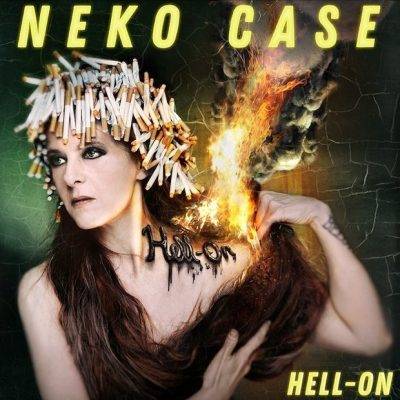Neko Case Hell On
Neko Case
Hell On
Anti
It’s Neko’s voice that draws you in. It is an undeniably ethereally beautiful instrument as it’s been from the very beginning when in the early ‘90s she was being hailed as the second coming of Patsy Cline. Some preferred to think of Wanda Jackson instead. Yet, Case’s lyrics, demeanor and overall stance eventually belied anything resembling classic country or pure rockabilly. She grew into a unique artist in this millennium with her own indie sound blending folk, rock, and pop – pretty much leaving the country behind. And, then it’s the voices surrounding Neko that have become an indelible part of her sound, principally with long-time collaborators Kelly Hogan and Nora O’Connor going back to the heyday of Bloodshot Records.
With Hell On, Case’s first record since 2013’s The Worse Things Get, The Harder I Fight, The More I Love You (maybe the longest title ever), Case embraces the collaborative spirit even more, stimulated by last year’s teaming with k.d. lang and Laura Veirs. Case’s voice is so distinctive that it can always be recognized but here she shares the vocal duties with Hogan, O’Connor, Beth Ditto, lang, Veirs, Rachel Flotard, Kathyrn Calder as well as some guys too. Robert Forster, Carl Newman (New Pornographers), and Joe Sieders are among the background vocalists and Case duets with Mark Lanegan on “Curse of the I-5 Corridor” and with Eric Bachmann on “Sleep All Summer.” Suffice to say, there are plenty of big choruses. This may be the most pop-driven album Case has made. Including the backing musicians, there are three dozen performers. As producer, she was clearly inspired by what she learned from lang, making the project more expansive and edgier.
Again, it’s Case’s singular voice, the blending of the voices, the use of reverb, and the infectious hooks that form her signature style. Oh, the lyrics – they are rather unique to say the least too. Case seems to often be in a dream world that ranges from scary to amazingly blissful with dashes of almost every emotion thrown in, as well as feminism, ecology, a fascination with animals, or lofty idealism. She recorded this album amidst chaos. Her Vermont home burned down while she was overseas, and she lost many valuable possessions. Hence, the album cover with the helmet made of cigarettes and the interior and exterior shots of her incinerated house that appear on the gatefold and booklet. All the living creatures present at the time of the fire were found alive, and so Case found a silver lining. “It felt like this out-of-time Jacques Cousteau undersea expedition through a sunken World War II ship. Of course there’s some shit I miss,” she says, citing family photographs and a favorite sweater. “But none of it matters.” Reflecting on the devastation of last year’s hurricanes, Case elaborates, “But when nature burns your house down, you can’t take it personally…In the big picture, my house burning was so unimportant…So many people lost so much more: lives and lives and lives”
She was also inspired by doing lots of reading about the importance of women in ancient history, giving her a renewed joyous outlook, a new way to tell stories. “I’m writing fairy tales, and I hear my life story in them, but they’re not about me. I still can’t figure out how to describe it. But I think that’s why we make music or write things. You’ve got to invent a new language.”
So, given that Case cannot even describe this new language, it’s incumbent on this writer not to interpret but rather make just a few comments on some of the tunes. Case wrote or co-wrote all the tunes except Bachmann’s. Parenthesis that follow reference the harmony singers. The opening title track (Flotard) starts innocently with a kalimba before blooming into a haunting lullaby with lines like” You’ll not be my master/you’re barely my guest.” “The Last Lion of Albion” (Veirs, Hogan, Flotard) is a requiem for landscape and animals, and “Halls of Sarah” (Veirs, Hogan, Flotard) hearkens back to mythology of muses and poets.
“Bad Luck” (Hogan, O’Connor) has an early ‘60s girl group sound with lines about superstitions and the lure of good fortune. The bouncy melody makes it one of the disc’s best tracks. “Curse of the I-5 Corridor” features Screaming Trees frontman Mark Lanegan and has some country tinges as Case mixes weird lyrics about reflecting on youth and former lovers. “Gumball Blue” and “My Uncle’s Navy’ were written with New Pornographers co-founder Carl Newman. She does “Sleep All Summer: with Eric Bachmann who penned the song. “Winnie” (Ditto, O’Connor, Hogan) is a pirate love song that looks at the way women have been historically worshipped, paid off with the line “That’s when I met Winnie/I wanted to be her sailor’s tattoo.” The closer, “Pitch or Honey” (Hogan, O’Connor) ends with a classic Case line “I love you better when you’re wild.”
Whether you understand these stories may not matter. You might have fun figuring out Neko’s twisted tales. In any case, the music is unlike anything else. Case keeps exploring and refining her singular approach.
- Jim Hynes
[amazon_link asins=’B07BF4L9SM,B00DBRT5D2,B07B22WF2X,B000W7Y2HS,B0017TC8HQ,B000W7Y2IC,B001MWGZDG,B014SGD4DG,B07B1SCC3X’ template=’ProductCarousel’ store=’maasc-20′ marketplace=’US’ link_id=’cf06384e-66c2-11e8-a3f1-9714233a1e2c’]
Discover more from Making A Scene!
Subscribe to get the latest posts sent to your email.














































